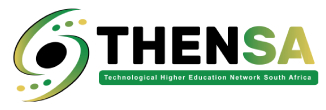Curriculum transformation has emerged as a critical aspect of higher education as universities adapt to changing needs and expectations of students and society. Here, we’ll explore the nature and characteristics of South African Universities of Technology (UoTs) while investigating the challenges and opportunities associated with curriculum transformation.
Understanding curriculum transformation at universities
Curriculum transformation entails reevaluating and reshaping the traditional approach to higher education curricula. It involves recognising the dynamic nature of the job market, the evolving needs of students, and the importance of interdisciplinary knowledge and real-world application. By embracing curriculum transformation, universities aim to provide students with the skills and competencies necessary for success in a rapidly changing world.
Nature and characteristics of South African universities of technology
South African UoTs are renowned for their distinctive educational approach. They focus on applied learning and developing practical skills to prepare students for the workforce. UoTs bridge the gap between theory and practice, providing students with hands-on experiences that align with industry needs. The curriculum at UoTs emphasises:
- Experiential learning
- Industry partnerships
- Entrepreneurship
- Technology
- Business
- Design
Challenges in curriculum transformation
Implementing curriculum transformation poses several challenges. Resistance to change, resource constraints, and ensuring faculty buy-in is among the obstacles universities face.
Maintaining core knowledge while striking a balance with the integration of emerging fields and technologies can be complex. Additionally, aligning curriculum changes with accreditation standards and regulatory requirements requires careful planning and collaboration.
Opportunities in curriculum transformation
Curriculum transformation offers numerous opportunities for universities, including industry-relevant skills, emerging technologies, and cross-disciplinary approaches. Universities can foster innovation, entrepreneurship, and social impact by engaging with local communities and businesses.
Moreover, curriculum transformation encourages student engagement, critical thinking, and problem-solving, preparing graduates to be adaptable and future-ready.
“We need technology in every classroom and in every student and teacher’s hand, because it is the pen and paper of our time, and it is the lens through which we experience much of our world.” – THENSA
Learn more about THENSA partnerships here.
Navigating the journey of curriculum transformation
Successful curriculum transformation requires a strategic approach. It begins with thorough needs assessments by:
- Stakeholders
- Faculty
- Students
- Industry Representatives
- Policymakers
Collaborative curriculum design processes, professional development programs, and the provision of necessary resources and support are crucial. Continuous evaluation and feedback loops enable universities to monitor the effectiveness of curriculum changes and adjust as needed.
South African UoTs leading the way
South African UoTs have been at the forefront of curriculum transformation, spearheading innovative approaches to higher education. Their emphasis on applied learning, work-integrated learning, and industry collaboration has resulted in highly employable graduates.
Through their commitment to inclusivity, diversity, and social responsiveness, UoTs contribute to the developed skilled workforce and sustainable economic growth in South Africa.
Curriculum transformation is essential for higher education institutions to meet the evolving demands of the modern world. South African UoTs exemplify the characteristics of institutions that have successfully embraced this transformation, preparing students for the workforce through applied learning and strong industry connections.
By navigating the journey of curriculum transformation, universities can redefine higher education and empower graduates to excel in their chosen fields.
At THENSA, our mission is to support future leaders by equipping them with the skills and knowledge required to thrive in today’s workplace. We’re all about revolutionising higher education through curriculum transformation making sure our graduates are job-ready and prepared to tackle any obstacles that come their way.

